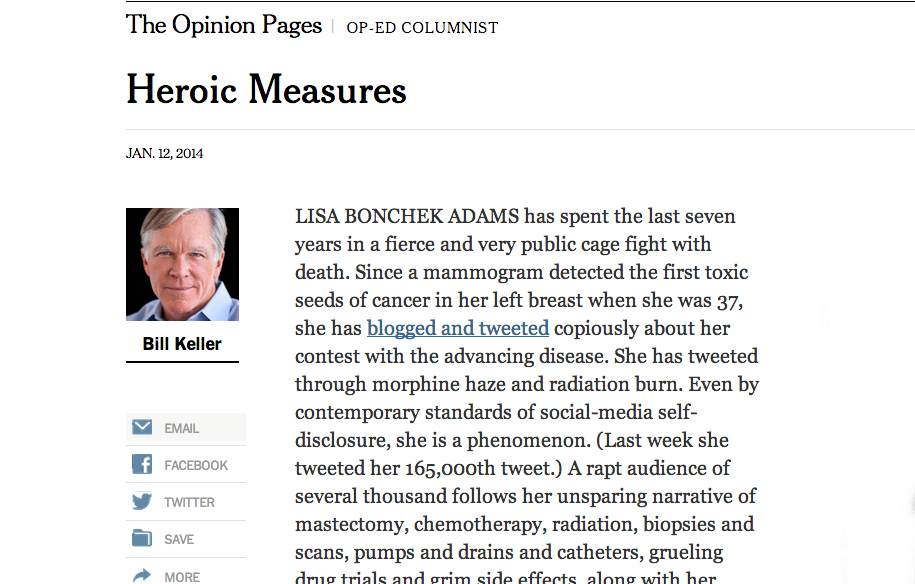Bill Keller, the former executive editor of The New York Times, and his wife Emma, are getting a lot of heat for both writing articles critical of a blogger living with cancer.
It started when Emma Gilbey Keller wrote an article about Lisa Bonchek Adams for Guardian.co,uk, asking whether she was providing too much information on her illness.
She wrote: " Are her tweets a grim equivalent of deathbed selfies, one step further than funeral selfies?"
The Guardian has now taken the article down "pending an investigation" (it's available here via the Wayback Machine) as its readers' editor decides what to do. The Guardian says the article was "inconsistent with the Guardian editorial code", which says: "People should be treated with sensitivity during periods of grief and trauma."
Her article was posted on January 8, but it took a while for public outrage to prompt The Guardian to act.

Will our memories be the ones she wants? What is the appeal of watching someone trying to stay alive? Is this the new way of death? You can put a "no visitors sign" on the door of your hospital room, but you welcome the world into your orbit and describe every last Fentanyl patch. Would we, the readers, be more dignified if we turned away? Or is this part of the human experience?
Emma Gilbey Keller later updated her article to express "regret" that private conversations between her and Adams were published. The update read:
Since this article was published two days ago, there's been a lot of negative comment on Twitter and below the line. Lisa Adams herself was upset by it. I had been in communication with her a number of times in recent weeks; given her health, I could have given her advance warning about the article and should have told her that I planned to quote from our conversations. I regret not doing so.
After that, Bill Keller wrote his on piece on Adams in the NYT, similarly asking questions about whether she should be so open, and courageous, about her illness.

Her digital presence is no doubt a comfort to many of her followers. On the other hand, as cancer experts I consulted pointed out, Adams is the standard-bearer for an approach to cancer that honors the warrior, that may raise false hopes, and that, implicitly, seems to peg patients like my father-in-law as failures.
My interest, as I said in the column, was in the continuing debate in American medicine about how aggressively to fight terminal diseases if the fight may mean trading quality of life for quantity. My view is that this is a highly personal choice that should be made by patients in consultation with their families and physicians. It is not always presented that way to patients. I don't think either of the Keller pieces was a "slam" of Lisa Adams or her choices
Adams herself was disappointed and "saddened" by the articles.
worth repeating to @nytkeller: "I am alive. Do not write me off & make statements about how my life ends TIL IT DOES, SIR."
.@emmagkeller many inaccuracies. I'm quite perplexed and concerned. Misses everything I'm trying to do. Stunned. Saddened.
I don't know why I, a person dedicated to education and personal choice by cancer patients, have been so mischaracterized as lay in hospital
Both writers have been accused of spectacularly missing the point and tone of Adams's public commentary of her illness, in an avalanche of online commentary.
Serious issues are raised in both articles. However distasteful and crass it might be to publicly question the actions of someone with late stage terminal cancer for the subject of a newspaper article, journalists are entitled to hold opinions offensive to some.
Another way of looking at it: what did the Kellers expect exactly? A powerful and influential media couple both taking time out to publicly criticise the actions of a dying woman doesn't sound like the wisest move of the century and it's no surprise how readers and supporters are reacting.
The Guardian still has questions to answer on why and how it came to publish Emma Gilbey Keller's article, and why it took the rare step of deleting it, and we'll update when we know more.
Update 16 Jan: The Guardian's readers' editor has now written an article about the affair not exactly apologising but admitting mistakes.
Chris Elliot writes: "I don't think it is wrong to frame a question about how those with incurable illnesses use social media, but the Guardian was wrong in the way it went about it. I have written to Adams to suggest we put up a fresh piece dealing with all her issues when she is able to engage with us, and to offer to publish a response entirely from her point of view."
